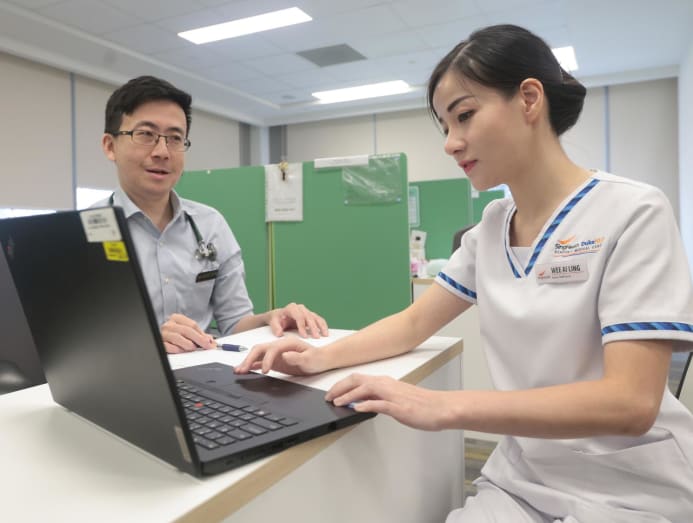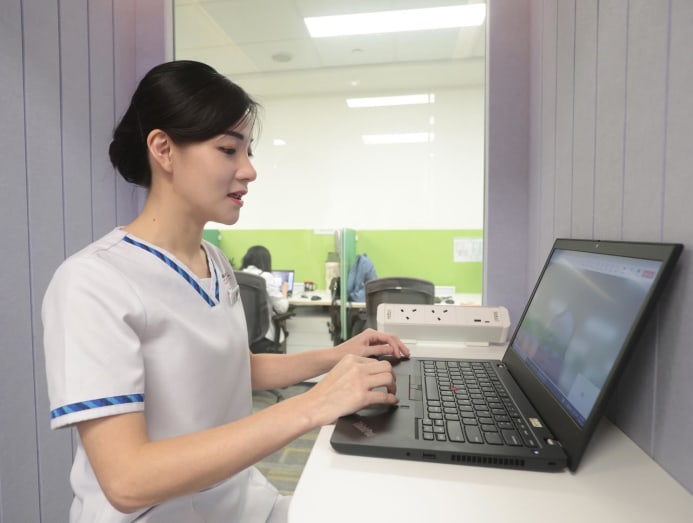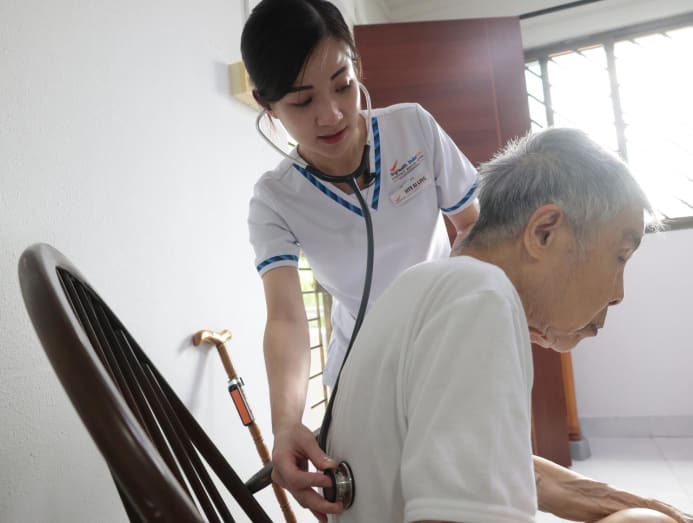The Stories Behind: The community nurse ensuring patients' care after they leave hospital, touching lives along the way
SINGAPORE — Think "nurses" and most people would picture health professionals bustling around a busy, sterile hospital setting. It is time, though, to broaden that notion now with the emergence of a growing number of community nurses.
For Ms Wee Ai Ling, the sphere of work for nursing extends far beyond hospital walls, encompassing a vital role often performed far from the public eye.
The 31-year-old is a hospital-to-home community nurse with the Singapore General Hospital (SGH), whose work revolves around managing patients who are discharged from the hospital because they are well enough to go home.
The community nursing programme places an emphasis on preventive health and the empowerment of patients to take charge of their health. Piloted in 2018, it has become a permanent feature of the healthcare scene here.
Ms Wee is part of a growing cadre of healthcare professionals who play this crucial role in delivering holistic care and support to patients beyond the hospital environment.
Like their hospital peers, these nurses wear uniforms.
The number of community nurses at various health service providers has jumped over recent years as the role became more integral to the health system.
The number under the National University Healthcare System (NUHS) — which includes National University Hospital, Ng Teng Fong General Hospital, Alexandra Hospital and Jurong Community Hospital — rose from 10 in 2017 to about 50 in 2023, CNA news channel reported last year.
Tan Tock Seng Hospital has seen its numbers more than double from about 20 nurses in 2018, while Singapore General Hospital has 82, up from 34 in 2018.
Ms Wee said in an interview with TODAY: "Nowadays, due to the Healthier SG initiative, everything is about preventive health and empowerment.
"You do very little on (preventive health) when you are working in the hospital environment, but when I work in the community, I am able to empower my patient to take charge of their own health and to stay well.''
When I prepared to meet Ms Wee on a recent Monday morning, I expected a chatty, outgoing individual given that interacting with a diverse number of people is part of her job.
Instead, Ms Wee struck me at first as a meek and mild figure, her soft voice and quiet demeanour the complete opposite of what I had expected.
She may have been unassuming in nature, but I got a better sense of her true character as I observed her conversing with a doctor about a patient.
She readily answered the doctor's questions, offering insights and recommendations with precision and clarity.

Perhaps her reticence stemmed from the presence of the TODAY photographer who was following her about in the busy office located in SingHealth Tower within the hospital grounds that was bustling with numerous other healthcare workers.
Ms Wee's demeanour transformed entirely when we later accompanied her to visit a patient for a post-hospitalisation check-up. She become more cheerful and talkative when she spoke to him and his caregiver.
BECOMING A COMMUNITY NURSE
Nursing was not Ms Wee's chosen vocation.
She had graduated with a diploma in food science and technology, before taking on a nursing degree at the National University of Singapore (NUS).
"To be honest, I did not always want to be a nurse. I wanted to be a dietitian," she said.
"When I found out that I was eligible for a nursing degree offered by NUS, I decided to go for it and when school started, I fell in love with every aspect of nursing."
Ms Wee added that her decision to study nursing was a leap of faith for her and came with a steep learning curve.
"It wasn't an easy switch from my food science and nutrition background into nursing, because most of my peers already had a nursing diploma, so they already had a nursing background to help them in their studies. Whereas for me, I had to start from scratch."
She had to put in extra effort to catch up with her peers, especially in the practical aspects such as inserting a urine catheter.
After graduating from university, Ms Wee was posted to the general surgery department of SGH for two years, before making the switch to the hospital's intensive care unit (ICU), where she worked for another five years.
The impetus to work in aftercare came from observing how some ICU patients required interventions to help them breathe, such as tracheostomy where a tube that carries air from the throat to the lungs through the front of the neck.
Ms Wee said that she decided she would like to be involved in a patient's aftercare following such invasive procedures, so in August last year, she applied for the hospital-to-home programme in order to become a community nurse.
"Aftercare is what I would say is very critical for the patient because if they are unable to be taken care of well in the community, or their caregiver cannot take care of them well, then they will come back to the hospital for a lung infection very easily," she explained.
"Working in the ICU, we don't usually do discharge planning. So, by joining community nursing, I get to be involved in what will happen to the patients after they go back home."

Ms Wee's job now involves doing phone and video consultations to follow up regularly with her patients after they are discharged, as well as conducting home visits to ensure that patients are recovering well or their caregivers are taking the correct steps to reduce complications.
"Now as a community nurse in the hospital-to-home programme, I find it rewarding to see patients take charge of their health and transit smoothly back into the community," she said.
MAKING A DIFFERENCE IN PATIENTS' LIVES
With most of her patients aged 80 and above, Ms Wee told me that she has to put extra effort into building rapport with them to convince them to change some of their ingrained habits.
Some elders may be stubborn and resistant to change, she added.
"I once had a patient that smoked one pack (of cigarettes) a day and he had stage four lung cancer. So I had to spend quite a bit of time talking to the patient and explaining to him about the risks and consequences of smoking."
At first, the patient did not take her advice well, but with regular follow-ups, she built rapport with the patient who eventually quit smoking.
"After all the home visits and the education that we gave him, he realised that he shouldn't be smoking so much since it can worsen his lung condition," she added.
One way she builds rapport with patients is by speaking in the language and dialect in which they are most comfortable. Ms Wee told me that she is conversant in English, Mandarin, Malay and the Chinese dialect of Hokkien.
There is the sense of fulfilment when patients are receptive to her advice, but there are bittersweet moments on the job as well.
Recounting an incident where a patient of hers died shortly after one of her visits, Ms Wee said that the patient's daughter expressed her gratitude for the work she did.
"I checked in with the daughter and she was very appreciative, saying that thanks to our home visits, it helped them to know what to do when their father's condition worsened and to manage their father's last moments as well," she recalled.
"When I receive such compliments, I feel like I've made a difference and that our programme benefited them in the long run."
As I followed Ms Wee on her rounds, I noticed her whole demeanour brightened when interacting with her patient, as she spoke in Mandarin, English and Hokkien so that the 90-year-old could better understand her.
When I asked the man what he thought of Ms Wee's services, he gave a thumbs-up, saying in Mandarin: "Very good! She helps me to take care of my health very well, she's very good."

As our interview concluded and we made our way to the lift lobby, I observed that Ms Wee lingered behind to have a conversation with the patient's son-in-law.
She pointed out the patient's slightly swollen feet and advised the younger man to seek medical attention promptly if he noticed any worsening of the patient's condition, leaving me impressed by her meticulous attention to detail and strong sense of responsibility towards her patients' well-being.
My initial impression of Ms Wee's meekness and diffidence had transformed into a profound appreciation for her dedication and passion.
Witnessing her light up while discussing patient care and her zealousness in every interaction, I could not help but feel inspired by her and have no doubt that she will continue to make a significant impact in her career.






